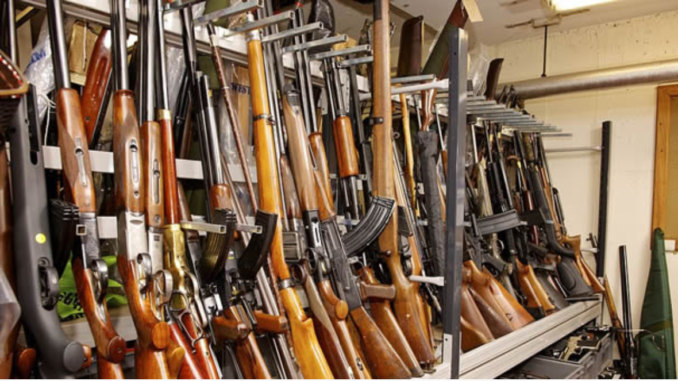
PROLIFERATION of arms and its ghastly consequences in the country have caught the attention of the United States Embassy in Nigeria, with the recent fears expressed by its Deputy Chief of Mission, David Young, that it might escalate violence in the 2019 general election, if not controlled. His fears are well founded. The diplomat’s misgiving came when he visited the scenes of the violent attacks in Plateau State, which have claimed hundreds of lives.
This degenerating state of security had compelled the Inspector-General of Police, Ibrahim Idris, in March, to direct police commands in the 36 states and Abuja to mop up illegal arms and ammunition. A 21-day ultimatum was issued for the bearers of such weapons to either surrender them or risk being arrested, investigated and prosecuted in line with the law.
But the recent massacres in Plateau and similar killings in Benue, Kaduna, Taraba and Zamfara states that preceded them show how badly the arms recovery effort has fared. Also worrisome is the increasing rate of arms and ammunition imports, some of which may have escaped the prying eyes of relevant security agencies. Recently, 150,000 rounds of ammunition were intercepted by the Nigeria Customs Service at the Tin-Can Island port. The Customs Area Controller, Musa Abdullahi, said the contraband was found in a 40-feet container that also harboured 28 pieces of jack-knives. Bearing of arms and ammunition without licence is illegal and a criminal offence.
Seizure of arms cache has become routine at Nigeria’s ports, land borders and highways. A total of 661 guns reportedly imported from Turkey were intercepted by Customs officials early last year, after they were successfully cleared from Apapa Port in Lagos. Officials were compromised, including those from the State Security Service, who collected N1 million, evident in the confession of the suspects. This is scary. If these agents of the state could easily be bought by these merchants of the instruments of violence, then the country’s depth of trouble could only be imagined.
Undoubtedly, Nigeria is a global security risk with Boko Haram and Fulani herdsmen listed among the five most deadly terrorist outfits, according to the Global Terrorism Index in 2015. Boko Haram was ranked the most deadly, followed by ISIS and al-Shabab and then the herders. Apart from the two Nigerian groups, activities of kidnappers and armed robbers add to the eerie mix. It is frightening that the Police and the military are as vulnerable as the civilians. On July 2, for instance, gunmen killed seven policemen on stop-and-search road duty in Abuja and disappeared. The Boko Haram jihadists routinely attack military bases and camps of internally displaced persons in the North-East, in an obvious show of resurgence.
It is the abundance of illegal arms that fuels violence. A ranking senator, who is apprehensive of this development, in March, accused members of his tribe – politicians – as the importers of the arms, as the 2019 elections draw nearer. “I remind them that this is the only country we have, if we destroy it, there will be nowhere else for us to go,” he warned. His charge is as clear as it is ominous.
The authorities should take note: politicians recruit thugs, buy arms and vehicles for them to do the dirty job of harassing, maiming and killing political opponents, besides snatching ballot boxes on Election Day.
These are barbaric tendencies that have smeared the country’s democratic processes since 1999. The Federal Government must wake up. It should not allow 2019 to beget another security monster, which previous political transitions produced in the militants in the Niger Delta region early in this Fourth Republic and Boko Haram insurgency in the North-East in 2007. These elements were the outlaws the politicians used and dumped; they mutated to become loose cannons of insecurity in the land. A few of them currently in police custody have given hints of their masterminds, and how they were recruited and armed.
However, the Nigerian state should not portray helplessness while these bandits run riot. The Nigeria Army had in June announced its seizure of some trucks laden with 300,000 cartridges for pump-action rifles. The situation calls for redoubled efforts by the appropriate agencies – Customs, Navy, Police and Army, Immigration – in securing our land and sea borders. Zamfara State is currently at the mercy of bandits from Niger Republic, who team up with local confederates to cause havoc. A former senator, Sa’idu Dansadau, claimed last week that 3,000 persons had been killed by bandits and N1.2 billion paid as ransom for the kidnapped victims. The state governor, Abdulaziz Yari, in expression of utter helplessness, announced that he was no longer the chief security officer of the state.
A country, which a United Nations Regional Centre for Peace and Disarmament, in 2012, said harboured 350 million illicit small and light weapons, representing 70 per cent of the 500 million in West Africa, ought to have realised long ago that it was sitting on a powder keg. This abnegation of responsibility should not continue to linger.
Therefore, President Muhammadu Buhari, as the chief security officer of the country, and his Service Chiefs should wake up from their snooze. The rumbling of gunshots at the premises of a Port Harcourt High Court in May this year as thugs belonging to rival political party camps battled for supremacy in a bid to stop a court judgement, presents a bird’s-eye view of what lies ahead, if the present official inertia and lack of imagination continue to spiral.
END

Be the first to comment